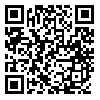Volume 12, Issue 46 (9-2018)
etiadpajohi 2018, 12(46): 87-100 |
Back to browse issues page
Islamic Azad University, Roudehen
Abstract: (4288 Views)
Objective: The purpose of this study was to predict the probability of returning to substance abuse based on resiliency and communication patterns in addicts' spouses. Method: A descriptive-correlational research method was employed for the conduct of this study. The statistical population of this research consisted of the addicts in the eighth municipal district of Tehran who had returned to drug use after withdrawal. Based on Cochran formula, 120 sample units were selected through random multistage sampling method. To measure the variables, Koerner, and Fitzpatrick's Revised Family Communication Pattern instrument (RFCP), and Connor-Davidson Resilience Questionnaire were employed. Logistic regression analysis was run to analyze the data. Results: The results indicated that it is possible to predict returning to substance abuse of participants according to the communication patterns which spouses used in their dialogues. The negative coefficient of communication variable indicated that as the score of spouses decrease in this variable, there would be an increase in the likelihood of returning to substance abuse. Therefore, it is necessary to improve communication patterns in order to reduce the rates of returning to substance abuse.
Type of Study: Research |
Subject:
General
Received: 2018/01/30 | Accepted: 2018/07/31 | Published: 2018/09/23
Received: 2018/01/30 | Accepted: 2018/07/31 | Published: 2018/09/23
| Rights and permissions | |
 |
This work is licensed under a Creative Commons Attribution-NonCommercial 4.0 International License. |


